- Best overall for startups: monday.com
- Best for kanban boards: Trello
- Best for team communication: Basecamp
- Best for development teams: Jira Service Management
- Best for collaboration: Asana
- Best for affordability and value for money: ClickUp
- Best for content creators and creative teams: Notion
- Best for data-driven startups: Airtable
- Best for service teams: Teamwork
- Ideal for fast-growing startups: Zoho Projects
- Best for project documentation: Confluence
Starting and running a successful startup involves managing a multitude of tasks and projects to reach your business goals and objectives. Project management software can help you manage your projects, monitor team performance and collaborate with stakeholders. From real-time tracking and reporting to task management, project management solutions can help you stay organized and maximize productivity.
SEE: Use our project manager hiring kit to find the best person to lead your project teams.
Whether you’re a small startup just getting off the ground or a rapidly growing organization, we evaluated the 11 best project management software options for startups, highlighting their standout features and pricing, as well as their strengths and weaknesses, to help you determine the best option for your team. We also analyzed the benefits of adding a project management tool to your workflow, key features to look out for when shopping for a project management software and how to select the best solution for your unique startup.
Featured Partners
Top project management software for startups compared
Here is a head-to-head comparison of the best project management software for startups.
| Free plan | Starting price for paid plans(per user, month-to-month billing) | Gantt charts | Time tracking | |
|---|---|---|---|---|
| monday.com | Yes | $12 | Yes | Yes |
| Trello | Yes | $6 | No | Power-Up required |
| Basecamp | No | $15 | Requires integration | Available as add-on |
| Jira | Yes | $8.15 | Yes | Available as add-on |
| Asana | Yes | $13.49 | Yes | Yes |
| ClickUp | Yes | $10 | Yes | Yes |
| Notion | Yes | $10 | Yes | No (time tracking templates available) |
| Airtable | Yes | $24 | Yes | Yes |
| Teamwork | Yes | $8.99 | Yes | Yes |
| Zoho Projects | Yes | $5 | Yes | Yes |
| Confluence | Yes | $6.05 | Available as add-on | Available as add-on |
monday.com: Best overall for startups

monday work management is an all-in-one project management solution for startups. As a scalable tool, it’s one of the most popular project and work management tools for all business sizes, from startups to large enterprises. monday work management excels in ease of use, customization, customer satisfaction, affordability and team collaboration to emerge as the overall best for startups.
Aside from project management, monday work management can also be used to manage resources, making it easy for startups to plan their resources, distribute work efficiently, allocate physical resources, monitor progress and track time spent on tasks and projects. Its view and reporting capabilities include activity log, workload, dashboard, kanban, timeline, calendar, map and Gantt Chart views.
Pricing
Prospective monday work management users can try the tool for 14 days before making a purchase decision. You can choose the plan that best meets your needs.
- Individual: Free for up to two members.
- Basic: $9 per seat per month, billed annually, or $12 per seat billed monthly.
- Standard: $12 per seat per month, billed annually, or $14 per seat billed monthly.
- Pro: $19 per seat per month, billed annually, or $24 per seat billed monthly.
- Enterprise: Custom quotes, contact monday work management sales team for quotes.
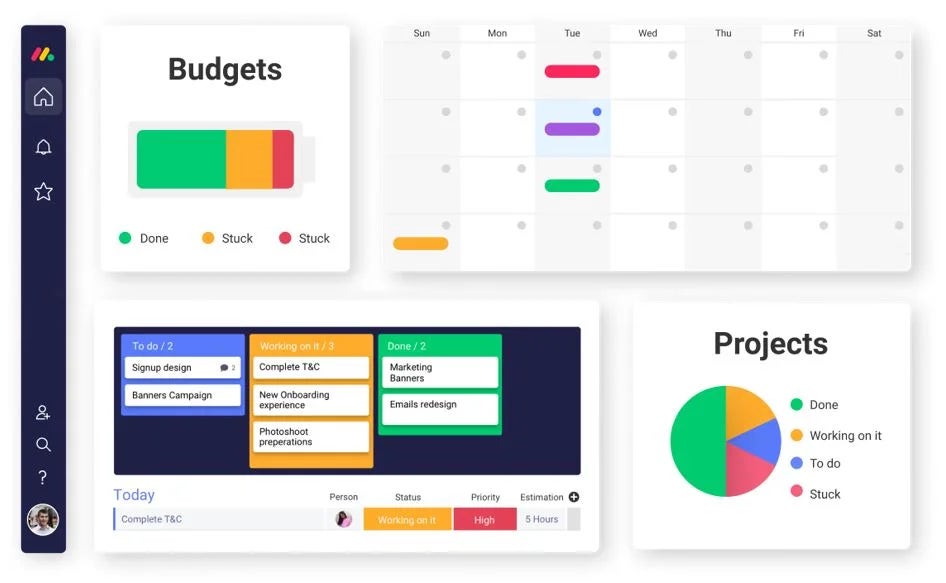
Standout features
- Self-service knowledge base.
- Integration with over 50 third-party services, including Slack, Stripe, Trello, HubSpot, Outlook, Zendesk, Jira Service Management, GitHub and more.
- Up to 1,000 GB file storage.
- Portfolio and resource management capabilities.
Top monday integrations
- Slack.
- Gmail.
- Microsoft Teams.
- GitLab.
- Mailchimp.
- Excel.
- Outlook.
- DocuSign.
Pros
- iOS and Android apps.
- Over 200 templates.
- 24/7 customer support for all plans.
- Two-factor authentication.
- Free version available.
Cons
- The individual plan is limited to two team members.
- The time tracking feature is limited to pro and enterprise plans.
Why we chose monday.com
We picked monday for its versatility and scalable nature. It’s a PM tool that can grow with a business from the startup stage to a fully-fledged enterprise. Monday offers an AI assistant tool to help users generate tasks, compose and rephrase emails, summarize complex tasks and build formulas. This is especially beneficial for lean startups looking to automate their workflows and increase efficiency.
SEE: For more information, read the full monday review.
Trello: Best for kanban boards

Startups usually adopt agile project management methodology, and Kanban is a framework used to implement agile. It’s built on a philosophy of continuous improvement and helps startups reduce the time it takes to complete a project.
Trello is a kanban-style project management tool designed for startups looking for an easy-to-use tool to manage their workflow. Its free plan includes unlimited cards, unlimited power-ups per board, up to 10 boards per workspace, assignee and due dates, mobile apps, integrations with essential tools (like Slack and Google Drive), 2-factor authentication and unlimited activity logs. All of these give startups the essential tools they need to manage simple projects at no cost.
Pricing
Trello offers a 14-day free trial for its premium plan, allowing buyers to try it before making a purchase.
- Free: For individuals or teams at no cost for unlimited cards and up to 10 boards per Workspace.
- Standard: $5 per user per month, billed annually, or $6 per user per month, billed monthly.
- Premium: $10 per user per month, billed annually, or $12.50 per user per month, billed monthly.
- Enterprise: Starts at $17.50 per user per month, billed annually, depending on the number of users.
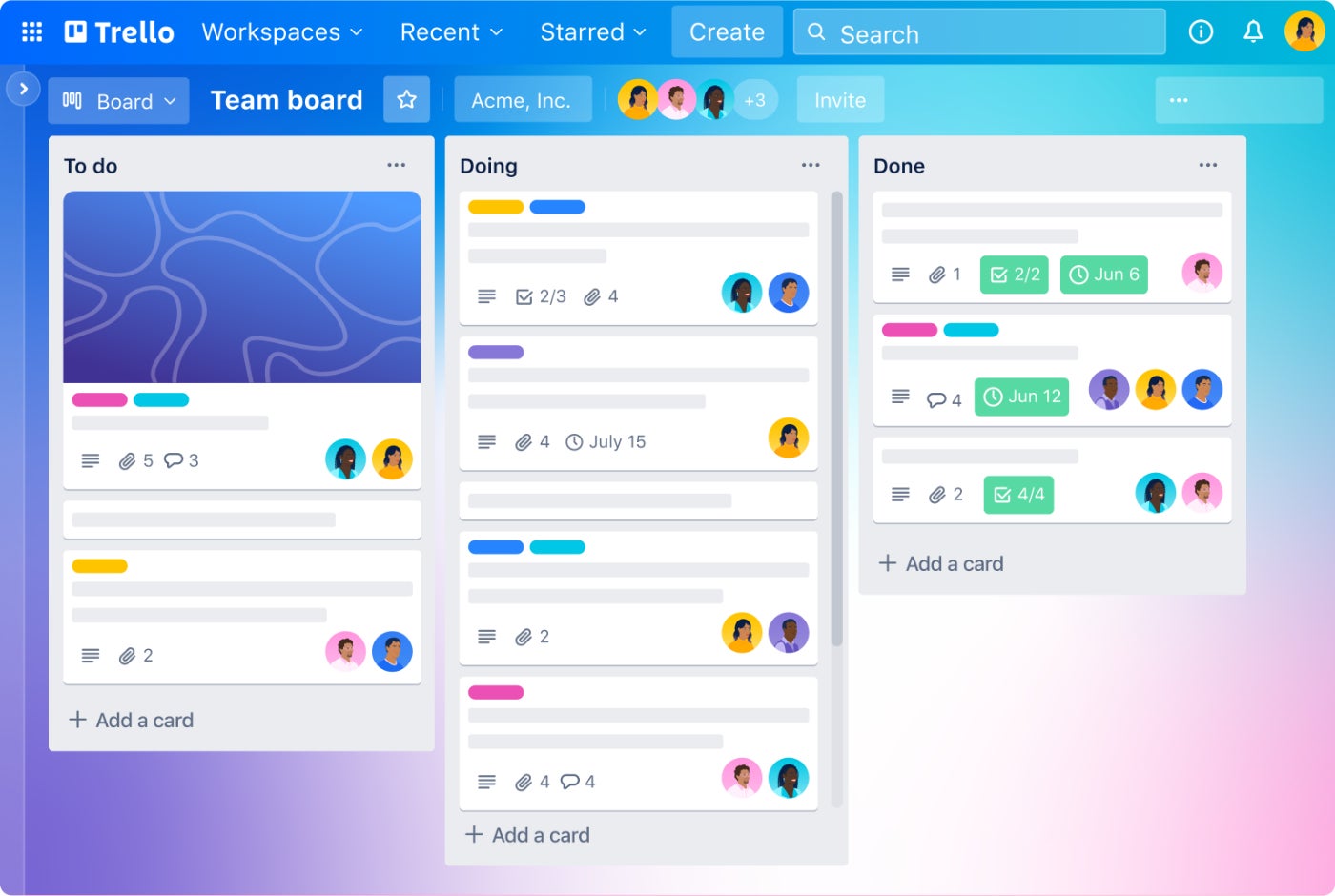
Standout features
- Integration of Power-Ups with over 200 apps, including Slack, Salesforce, Google Drive and more.
- Multiple view options, including boards, maps, calendars, timelines and table views.
- Two-factor authentication.
- Creation of rules, buttons and commands to automate user workflow with Trello’s Butler.
Top Trello integrations
- Gmail.
- TeamGantt.
- Google Drive.
- Zendesk.
- Evernote.
- Time Tracker – Chronos.
Pros
- Mobile apps for Android and iOS.
- Ease of learning and use.
- Unlimited storage.
- Used by over two million teams.
Cons
- Limited support for the low-tier plans.
- Limited analytics and reporting capabilities.
Why we chose Trello
It does not require extensive training or onboarding, making it ideal for startups with limited resources and time. Aside from project management, startups can also use Trello to onboard new members, manage tasks and brainstorm ideas. It can also be used as a resource hub to help teams find information.
SEE: For more information, read the full Trello review.
Basecamp: Best for team communication

Built for freelancers, startups and small teams, Basecamp is a project management solution designed by 37signals to help users track projects’ progress, store and share relevant documents and communicate across the organization.
With Basecamp, users can create meeting agendas, document meeting minutes and communicate in real time via Ping ‘em, a one-on-one chat feature or Campfire, a real time group chat for general team discussion. Basecamp ranks high for team collaboration and communication. If your team needs to be in touch frequently, consider checking out this tool.
Pricing
Basecamp offers a 30-day free trial to enable prospective customers to try it before making a purchase. It has two payment plans, which include month-to-month pay-as-you-go billing and one-time annual payments for the entire organization.
- Basecamp: $15 per user per month, billed monthly.
- Basecamp Pro Unlimited: $299 per month, billed annually, or $349 per month, billed monthly.
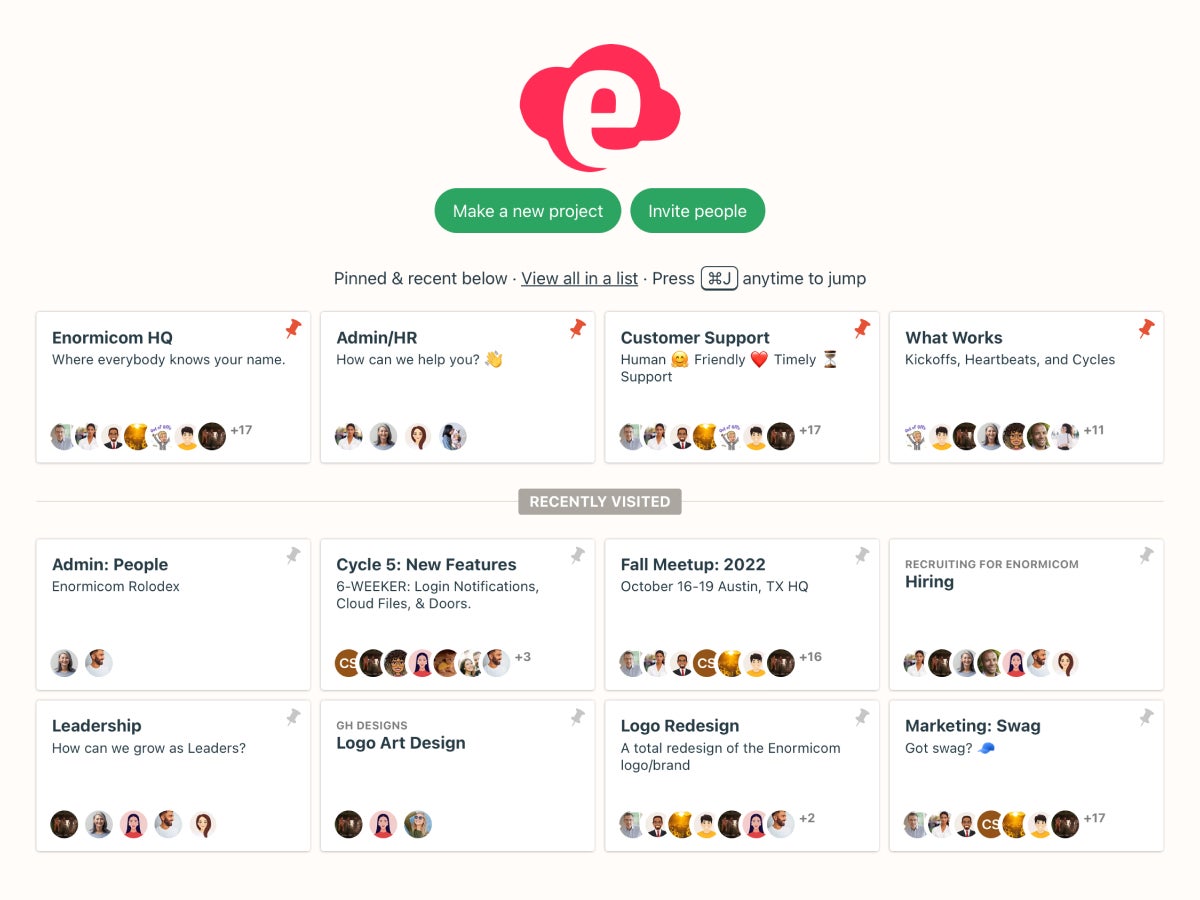
Standout features
- Hill Charts feature, a 10,000-foot visual representation of project progress.
- One-on-one direct messaging or group chats.
- Documents and file storage.
Top Basecamp integrations
Basecamp supports integration with over 75 apps.
- Very Cloudy.
- Pro Backup.
- Clockify.
- Zoho Flow.
Pros
- Free for invited guests.
- Message boards for team discussions.
- Ability for users to track work, deadlines, responsibilities, progress and details with To-dos.
Cons
- Lacks a free plan for business.
- Not ideal for complex projects.
Why we chose Basecamp
Basecamp offers a centralized platform for team members to collaborate and communicate conveniently. The real-time messaging feature facilitates quick communication and reduces the need for constant back-and-forth emails.
SEE: For more information, read the full Basecamp review.
Jira Service Management: Best for development teams

Developed by Atlassian, Jira Service Management is an issue and bug tracking project management tool. It’s suitable for software development and DevOps teams managing an agile project. With Jira Service Management, startups can plan new projects by breaking down complex ideas into user stories, issues and tasks across teams, track projects to monitor progress, release products, gain insights into teams’ performance from real time visual data and automate workflow.
Pricing
Jira Service Management offers a 7-day free trial for teams to test-run it to determine if it’s the best fit for them. Those interested in the Data Center plan can try it for 30 days.
- Free: For Up to 10 users.
- Standard: $8.15 per user per month, billed monthly, or $850 per year for one to 10 users.
- Premium: $16 per user per month, billed monthly, or $1,600 per year for one to 10 users.
- Enterprise: Custom quotes.
- Data Center: Starts at $44,000 per year for 500 users; rates depend on the number of users.
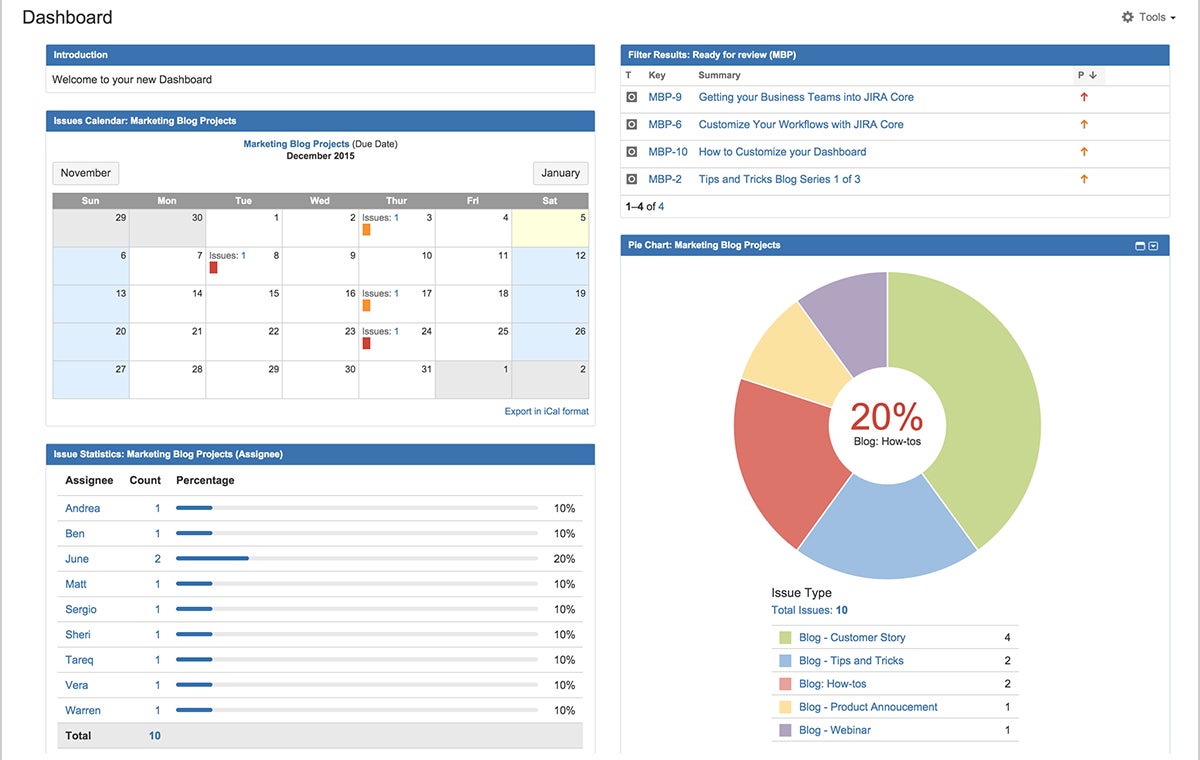
Standout features
- Drag and drop automation.
- Scrum and kanban boards for agile teams.
- Dependency management.
- Full access to Jira Work Management.
Top Jira Service Management integrations
Support integration with over 3,000 apps, including:
- GitLab.
- Figma.
- AWS service management connector.
- Azure DevOps for Jira.
- Clockify.
Pros
- Use by agile teams outside the tech space.
- Customizable project dashboard.
- Roadmaps for tracking project progress.
Cons
- Limited support for free and standard plans.
- Steep learning curve for new users.
Why we chose Jira
Jira Service Management is built for teams of one to 20,000, making it ideal for fast-growing startups looking for a scalable solution that can grow with their needs and changing organizational structure.
SEE: For more information, read the full Jira Service Management review.
Asana: Best for collaboration

With Asana, startups can monitor their project’s progress, track individual tasks, plan sprints and integrate with other tools. Asana might be expensive for small businesses, but it makes up for this with a generous free plan for up to 10 team members. This free plan includes all the necessary features required to manage simple projects from start to finish. It also sends task notifications with due dates to assignees daily, giving them an extra push to complete their tasks on time.
Asana allows users to collaborate on projects, comment on tasks and tag team members using @mentions in order to call their attention.
Pricing
Asana offers a one-month free trial.
- Personal: No cost for up to 10 team members.
- Starter: $10.99 per user per month, billed annually, or $13.49 per user per month, billed monthly.
- Advanced: $24.99 per user per month, billed annually, or $30.49 per user per month, billed monthly.
- Enterprise: Custom quotes.
- Enterprise+: Custom quotes.
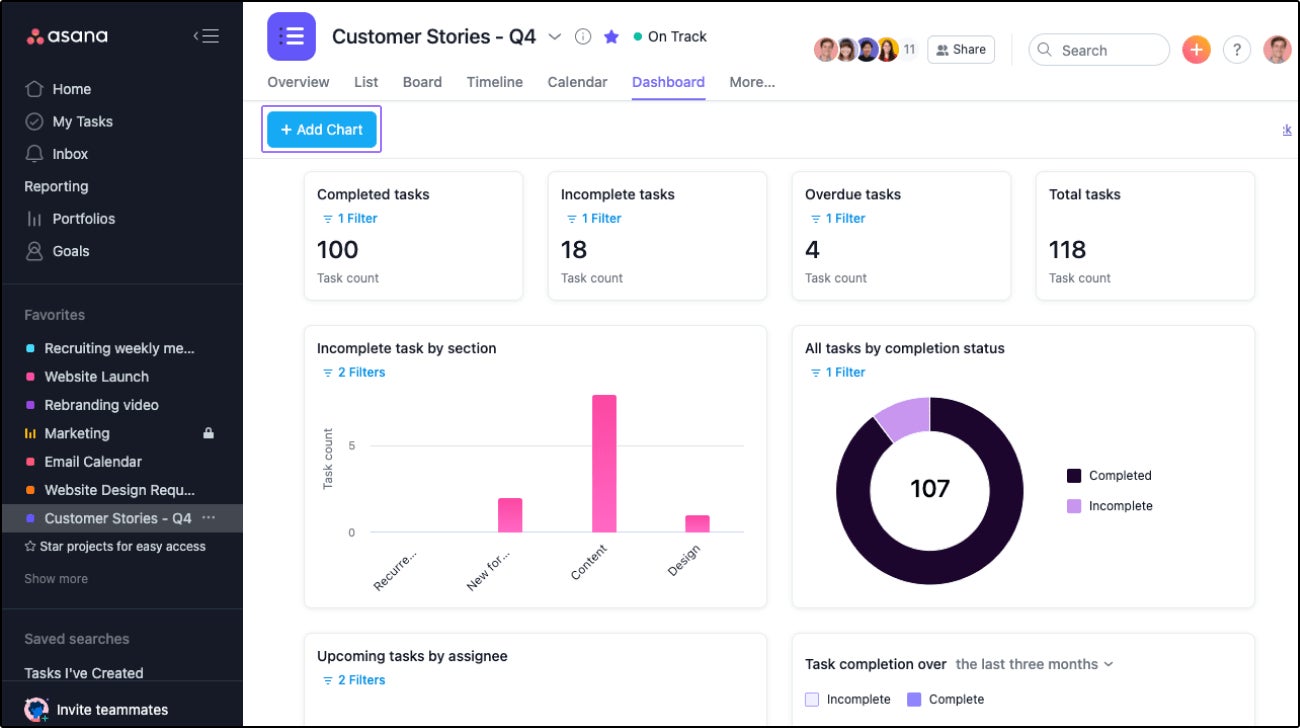
Standout features
- Task and sub-task management.
- Unlimited projects, messages, activity logs and tasks.
- List, board, calendar, timeline and Gantt views.
- Resource management.
Top Asana integrations
Integration with over 100 third-party services.
- Salesforce.
- Adobe Creative Cloud.
- Tableau.
- Power BI.
- Splunk.
Pros
- Mobile apps for iOS and Android.
- Feature-rich tool.
- Workload views and reporting.
- Unlimited file storage.
Cons
- Pricey for small businesses.
- 24/7 support is only available to enterprise plan users.
Why we chose Asana
We selected Asana as a top-rated tool for startups because of its extensive collaboration features. The real-time commenting feature enables team members to collaborate on tasks, exchange ideas and provide feedback, fostering a collaborative work environment.
SEE: For more information, read the full Asana review.
ClickUp: Best for affordability and value for money

With ClickUp, users can manage basic, simple and complex projects with ease. The platform offers a generous free plan that includes the necessary features (unlimited tasks, unlimited free plan members, 2FA, collaborative docs, real-time chat, native time tracking and more) that budget-conscious startups need to manage projects.
ClickUp is suitable for teams looking for a versatile project management tool, as well as those using agile methodologies, due to its support for agile frameworks like Kanban boards and Scrum. It also integrates with over 1,000 tools, making it easy for startups to connect it with their commonly used tools and maintain efficient workflows.
Pricing
ClickUp offers tiered pricing plans; the best plan for you depends on your required features.
- Free: No cost for unlimited members.
- Unlimited: $7 per member per month, billed annually, or $10 per member per month, billed monthly.
- Business: $12 per member per month, billed annually, or $19 per member per month, billed monthly.
- Enterprise: Pricing is available on request.
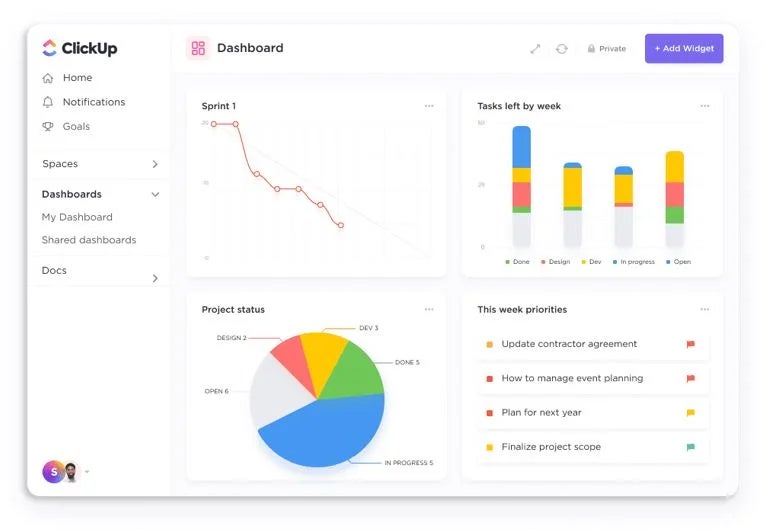
Standout features
- 15+ highly customizable views.
- Multiple assignees.
- Native time tracking.
- In-app video recording.
- Proofing — image and PDF annotation.
Top ClickUp integrations
- Outlook.
- Slack.
- GitHub.
- GitLab.
- HubSpot.
Pros
- 24/7 support.
- Unlimited free plan members.
- Generous and feature-rich free plan.
- Lots of automation options.
Cons
- Storage is limited to 100MB in the free plan.
- Learning curve for new users.
Why we chose ClickUp
ClickUp’s free plan includes the necessary features for startups to manage their tasks and projects, allowing those with limited budgets to access a project management tool without investing heavily in software. The paid plans are also reasonably priced for the kind of features included.
SEE: For more information, read the full ClickUp review.
Notion: Best for content creators and creative teams
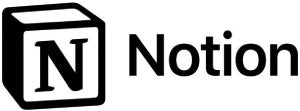
For freelancers and students, Notion may be a note-taking app. But, it can serve as a productivity tool or project and task management solution for startups, solopreneurs, small businesses and enterprises. Hence, it’s usually referred to as a multi-purpose app that can be used to build custom workspaces.
Pricing
Notion offers a free plan plus three paid plans. Users can purchase the Notion AI add-on in addition to their plan at $8 per member per month, billed annually, or $10 per member per month, billed monthly.
- Free: No cost plan with limited features.
- Plus: $8 per user per month, billed annually, or $10 per user per month, billed monthly.
- Business: $15 per user per month, billed annually, or $18 per user per month, billed monthly.
- Enterprise: Custom quote.
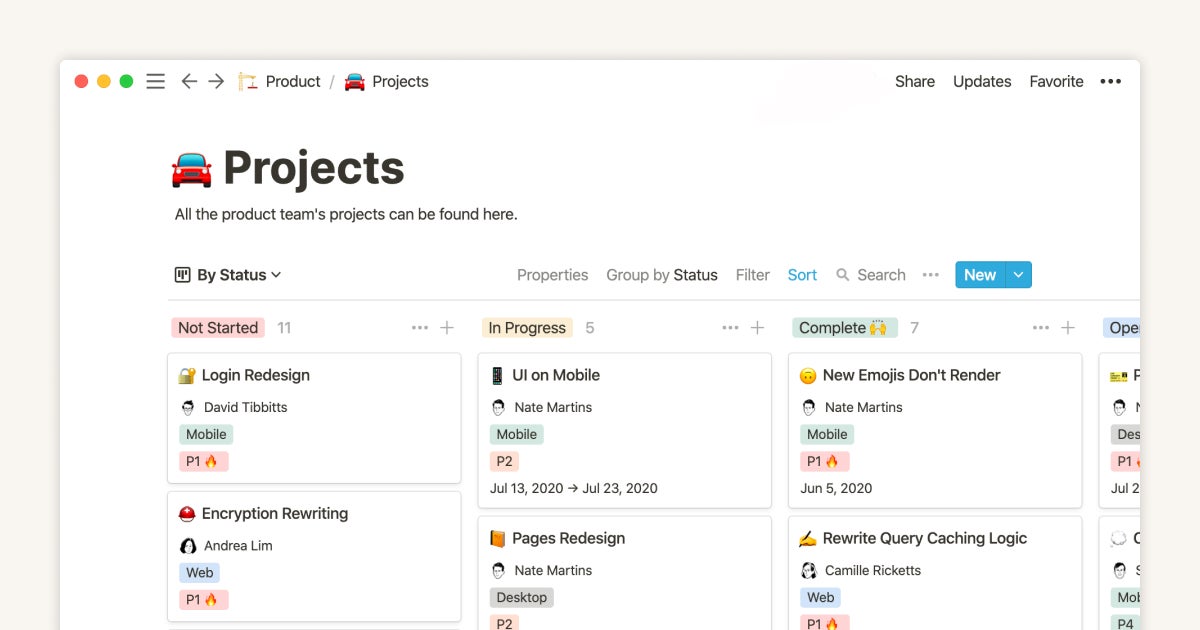
Standout features
- Notion AI, which can help users generate summaries, rewrite docs, find action items and more.
- Unlimited file uploads.
- Ability for users to export their workspace as HTML, Markdown and CSV.
- Note tracking and document management.
Top Notion integrations
- Slack.
- Splunk.
- Datadog.
- Nightfall AI.
- GitHub.
Pros
- User-friendly and easy to learn.
- Excellent note-taking capabilities.
- Capability to build wikis.
Cons
- Lacks advanced project management features.
- Complex initial setup.
Why we chose Notion
With Notion, startups can manage tasks, track projects, create to-do lists, bookmark items and create wikis, making it easy for teams to find and access information quickly.
SEE: For more information, read the full Notion review.
Airtable: Best for data-driven startups

Airtable is a low-code spreadsheet database and project management tool that enables startup teams to manage, organize and collaborate on structured data. It combines the features of a spreadsheet with the database capabilities of a relational database — such as search and sorting — and allows users to create custom forms and views.
It can be used to store and manage any type of data, including contacts, workflows, project plans and more. Airtable provides a user-friendly interface for creating and organizing data, with features such as drag-and-drop functionalities, customizable forms and pre-built templates.
Pricing
- Free: No cost for up to 5 creators or editors.
- Team: $20 per seat per month, billed annually, or $24 per seat per month, billed monthly.
- Business: $45 per seat per month, billed annually, or $54 per seat per month, billed monthly.
- Enterprise Scale: Custom quotes.
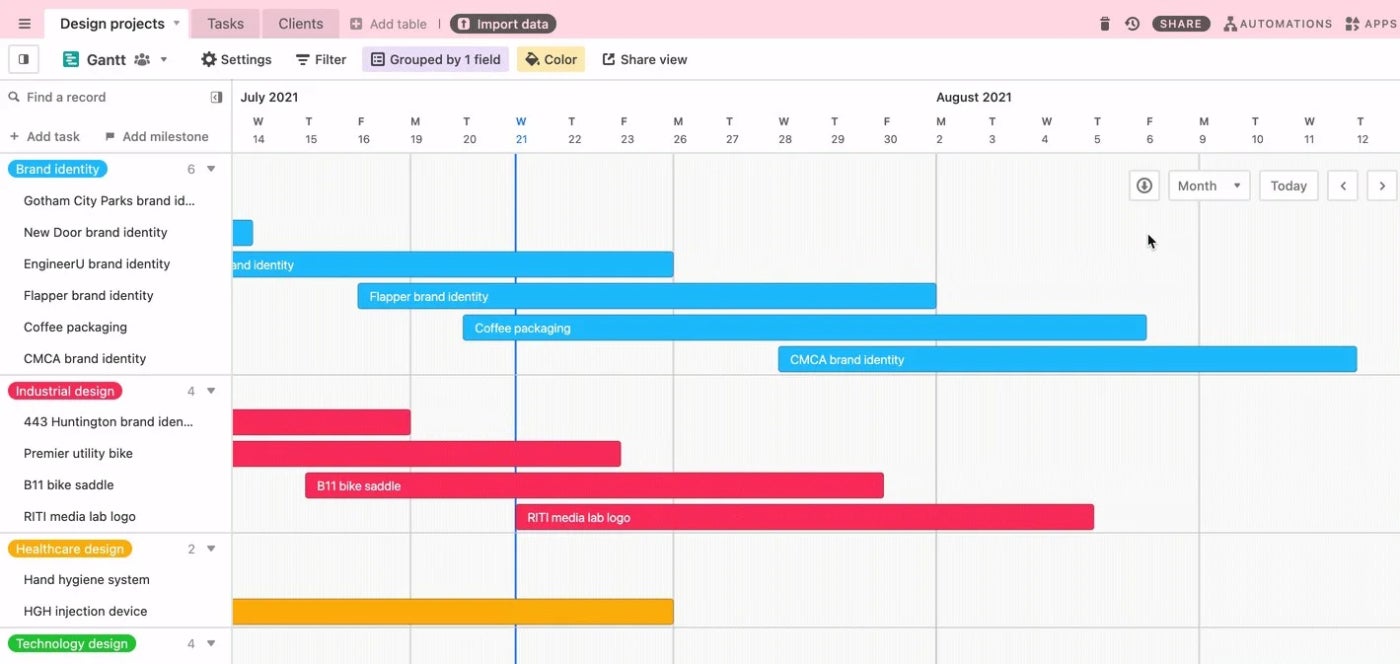
Standout features
- Extensive view options, including grid, calendar, form, list, kanban, Gantt and gallery views.
- Project and workflow management.
- Role assignment for collaborators, including owner/creator, editor, commenter and read-only.
- Use for project management, CRM, event planning and many other tasks.
Top Airtable integrations
- Jira.
- Salesforce.
- Tableau.
- Google Drive.
- Zendesk.
Pros
- Web, desktop, iOS and Android apps.
- Real-time collaboration and communication.
- High customizability to suit user needs.
Cons
- Gantt view limited to Pro and Enterprise tiers.
- Intuitive apps builder.
- Limited support.
Why we chose Airtable
We picked Airtable for Startups working with lots of data, as it provides a highly flexible and customizable platform for organizing and managing complex data sets. Its spreadsheet-like interface combined with a relational database makes it easy to create tables, link records and establish relationships between different sets of data.
SEE: For more information, read the full Airtable review.
Teamwork: Best for service teams

Teamwork is an all-in-one project management tool for agencies, creative and professional service teams to manage their clients’ work. Teamwork is one of the best project management software for marketing teams due to its capability to manage project resources, track time and manage invoices and budgets.
With Teamwork, startups can plan, manage and track projects’ progress in real-time. It also features project templates, collaboration tools and a reporting dashboard.
Pricing
- Free forever: No cost for up to five users.
- Starter: $5.99 per user per month, billed annually, or $8.99 per user per month, billed monthly.
- Deliver: $9.99 per user per month, billed annually, or $13.99 per user per month, billed monthly.
- Grow: $19.99 per user per month, billed annually, or $25.99 per user per month, billed monthly.
- Scale: Custom quotes.
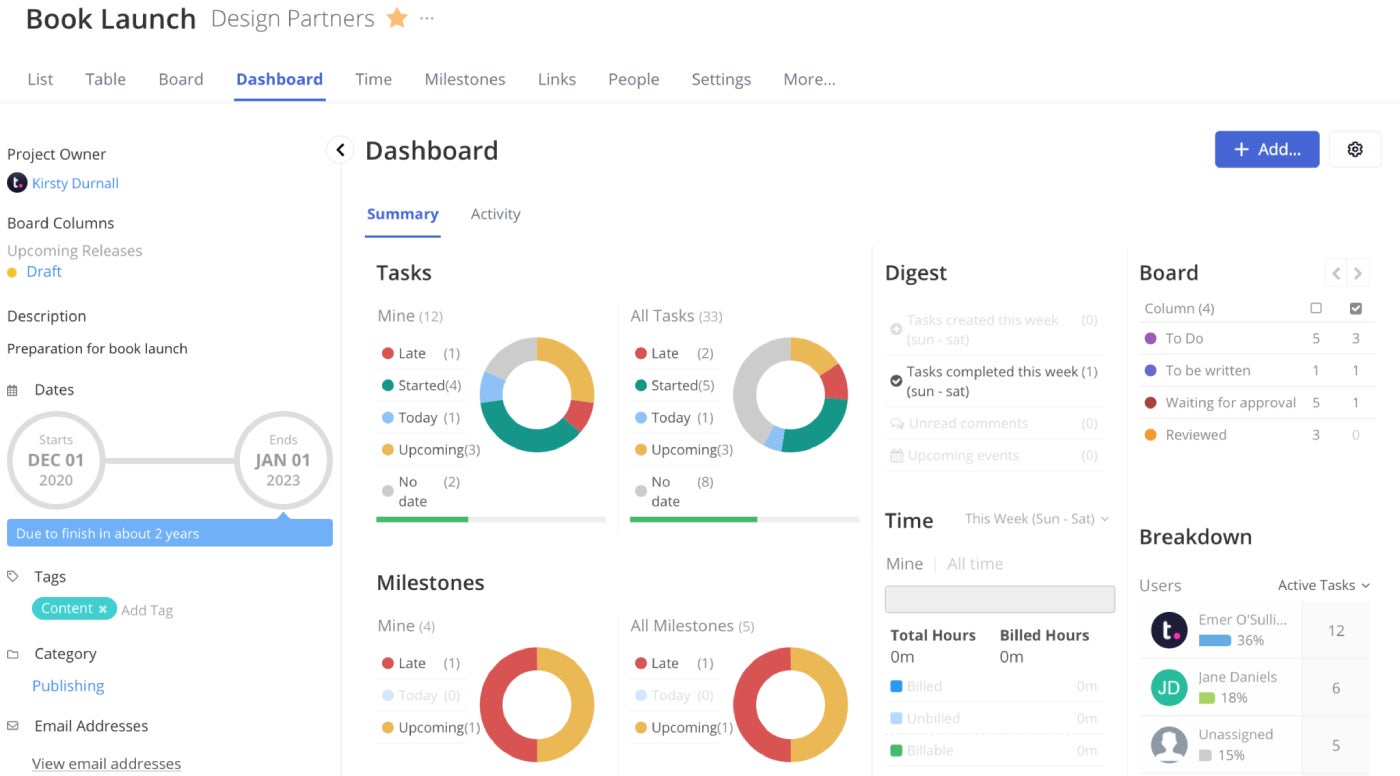
Standout features
- Multiple project views, including List, Table, Boards and Gantt chart.
- Billable time tracking.
- Integration with third-party tools like Slack, Box.com, Harvest, Quickbooks, HubSpot and more.
- Google Chrome extension and Gmail add-on, which allow users to use the tool from their browser and create tasks via the Gmail app.
- Project risk management.
Top Teamwork integrations
- Slack.
- Google Drive.
- MS Teams.
- SoftSync.
- Box.com.
- OneDrive Personal.
- Dropbox.
- Zapier.
Pros
- Budgeting, billable hours, expense tracking and invoicing capabilities are pluses.
- Automation capability.
- Inclusion of task essentials such as sub-tasks, tags and dependencies.
Cons
- Teamwork’s free plan lacks phone, live chat and email support.
- Users can’t do much with its free plan.
Why we chose Teamwork
Teamwork has built-in client management capabilities, allowing you to track client information, manage client-specific tasks and communicate with clients directly within the platform. This feature is particularly useful for service-based startups that rely on maintaining strong relationships with their clients.
SEE: For more information, read the full Teamwork review.
Zoho Projects: Ideal for fast-growing startups

With Zoho Projects, startups can plan and manage their projects, track their progress and collaborate and communicate with ease. It has project planning and scheduling, task collaboration, time tracking, resource management and bug tracking capabilities, as well as a host of other features. It can be used to manage projects of any size, from simple to complex.
It offers multiple integrations with other Zoho products, such as Zoho meetings, Zoho Sprints, Zoho CRM, Zoho invoices and books, Zoho analytics, Zoho Flow, Zoho Desk, Zoho People and Zoho Directory, as well as third-party applications like Slack, Microsoft Teams, GitHub, BitBucket, GitLab and more.
Pricing
- Free: No cost for up to three users.
- Premium: $4 per user per month, billed annually, or $5 per user per month, billed monthly.
- Enterprise: $9 per user per month, billed annually, or $10 per user per month, billed monthly.
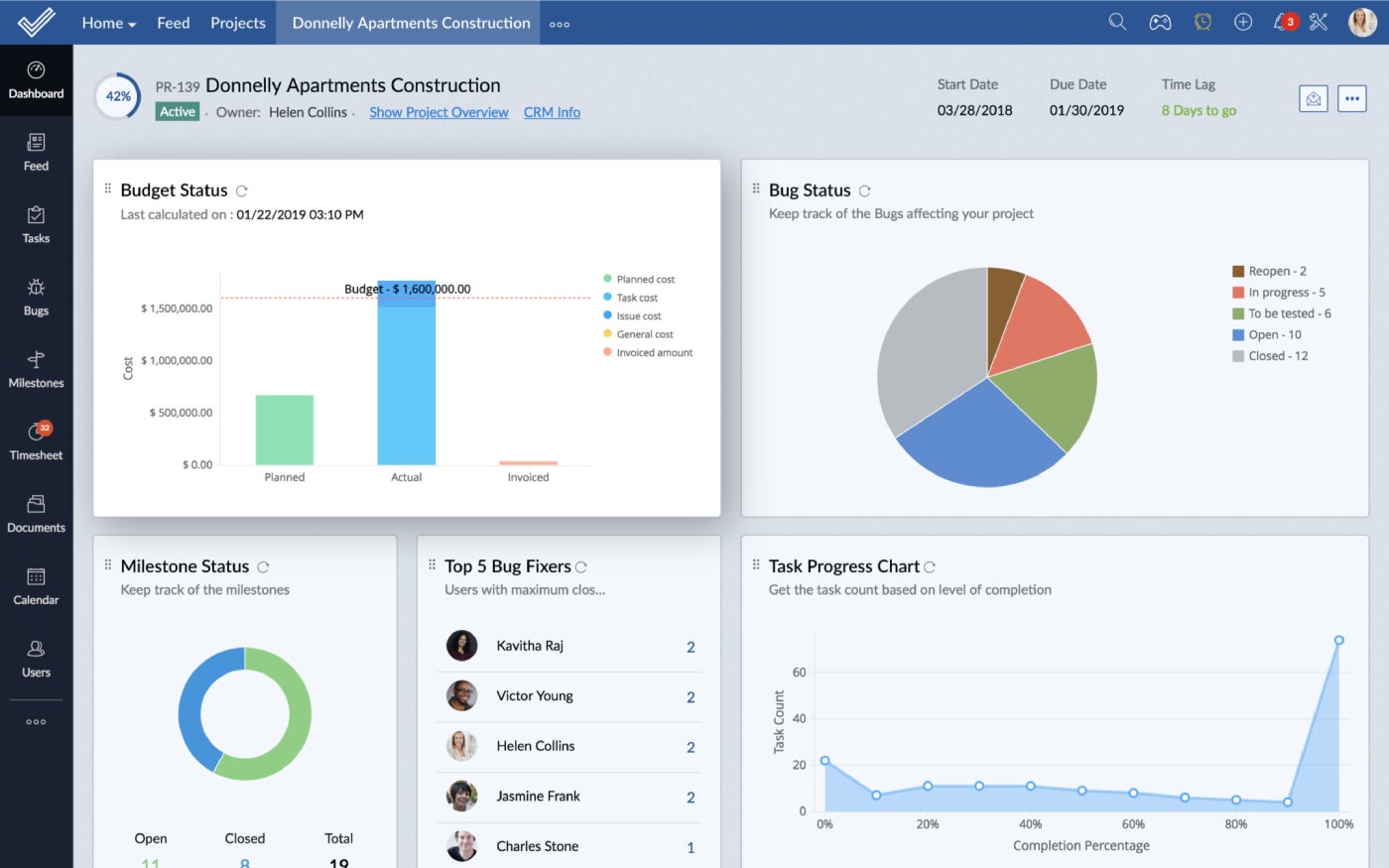
Standout features
- Supports 17 different languages.
- Issue management for bug fixes.
- Task reminder via email.
- Team collaboration via mentions, chats, feeds, forums and more.
- Automation capabilities to let users set workflow and business rules, automate notifications and create an escalation procedure for fast issue resolution.
Top Zoho Projects integrations
- Basecamp.
- Google Drive.
- Jira.
- Microsoft Teams.
- Dropbox.
- GitHub.
- Slack.
Pros
- Great charts and reports.
- User administration capability.
- AI Chatbot powered by Zia.
Cons
- Limited storage.
- Bug reporting can be improved.
Why we chose Zoho projects
Zoho is an ecosystem on its own —it offers numerous integrable software and tools that can support fast-growing startups in various aspects of their operations, from CRM to finance, to video conferencing to team chat and one-on-one chat.
SEE: For more information, read the full Zoho Projects review.
Confluence: Best for project documentation

Confluence is one of the best project management software for creative teams. Initially designed as a knowledge management system, Confluence now serves as a collaborative tool that helps teams create, share, organize and review project documents. Its page versioning capability allows users to track page history and compare versions, making it easy for teams to review project documentation over time.
Startups looking for a collaborative platform to document their project progress or create a wiki and knowledge base may find Confluence resourceful.
Pricing
- Free: No cost for up to 10 users.
- Standard: $6.05 per user per month, billed monthly, or $600 per year for one to ten user tier.
- Premium: $11.55 per user per month, billed monthly, or $1,150 per year for one to ten user tier.
- Enterprise: Custom quotes.
- Data Center: $28,000 per year for up to 500 users.
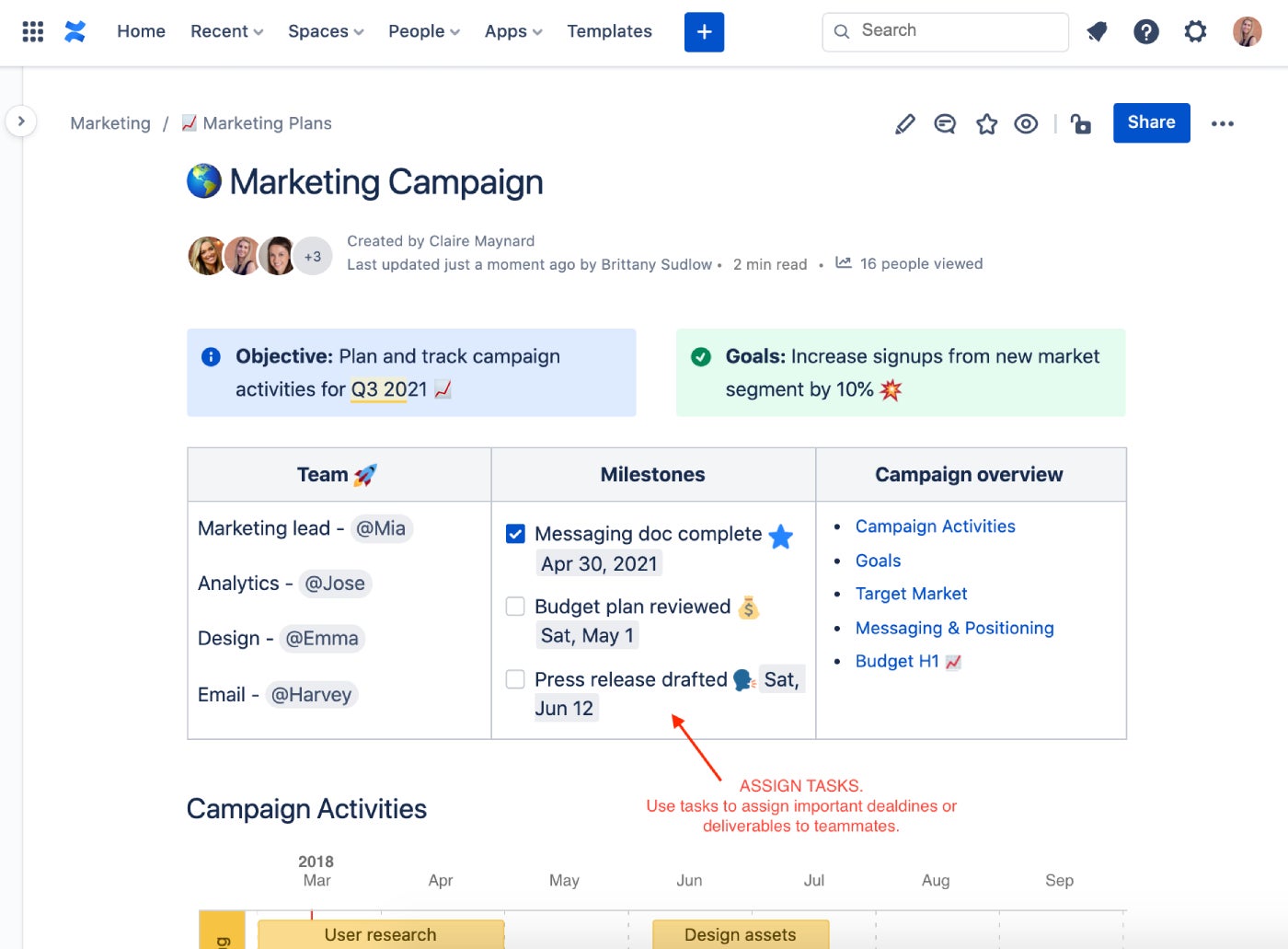
Standout features
- Ability for users to co-edit pages in real time.
- 1,000+ integrations.
- Customizable email notifications.
- Unlimited spaces and pages.
- Page versioning.
Top Confluence integrations
- Google Drive Connector for Confluence – Sheets, Docs and Slides.
- Trello Embed+ for Confluence.
- Asana for Confluence.
- Google Analytics in Confluence.
- Figma Viewer for Confluence.
Pros
- Helpful documentation from Confluence.
- Enterprise-level security.
- Mobile apps for Android and iOS.
Cons
- Limited support for the low-tier plans.
- Steep learning curve for non-technical users.
Why we chose Confluence
Confluence provides users with a wide range of content creation tools, including text formatting, tables, files, images and multimedia embedding. This allows for comprehensive project documentation, making it easier to communicate ideas and concepts.
SEE: For more information, read our full Confluence review.
What are the benefits of project management software for startups?
Generally, project management tools help organizations improve project success rates, promote transparency and help teams deliver quality projects on schedule. Aside from these benefits, there are other noteworthy merits of project management tools for startups, specifically.
Streamlined operations
Oftentimes, startups are new businesses looking to break into the industry where they operate and finding what works best takes time. It is also a learning curve for most founders when looking for the best way to serve their clients or customers.
Project management takes this pain away by streamlining their operations — each team member knows what to do and when to do it and sees how their work impacts the general team, as some tasks must be completed for others to start.
Track progress
With project management tools, startups can estimate and forecast project completion time and monitor and track their progress over time to ensure they are on schedule. It also helps individual team members track the progress of their tasks.
Thanks to the time tracking feature, startups can also track how much time they spend on different projects, allowing them to know which project is adding to their bottom line as well as where they are spending too much time in order to optimize their time properly.
Better collaboration
When managers and teams collaborate on tasks, they achieve better results. Project management software offers a variety of collaboration methods, including instant one-on-one messaging, @mentions, comments, tags and video conferencing. This ensures that everyone on the team is on the same page.
Remote working
Project management software enables managers to assign tasks to team members regardless of where they dwell. Stakeholders, freelancers, contractors and other location-independent team members can collaborate on the same project and deliver on time using project management.
All the tools listed above support remote working and also offer mobile apps to support mobility, making it easy for your teams to function no matter where they work from.
What are the key features of startup project management software?
When shopping for a project management solution, be on the lookout for some of these key features.
Time tracking
With time tracking, managers can keep track of team members’ hours of work, as well as project and task duration. This is especially beneficial for startups that pay by the hour, as the tool helps document employees’ billable hours. Agencies that charge clients based on hours worked can also use project management time tracking features to calculate the time spent on a project, thus helping with budget and invoice preparation.
Collaboration tools
It is commonplace for project management to include at least basic collaboration tools like @mentions, commenting and integration with tools like Slack to aid team communication. The tools we evaluated above allow teams to collaborate efficiently. For instance, Basecamp allows teams to send direct messages to team members and communicate with the general team via group chat. Asana provides options for team members to comment on tasks and conversations.
Other tools also provide collaboration features, so it is important to assess which one is the best fit for your team’s needs.
Resource management
Startups are usually intentional about how they use resources. Look for a solution that can help you manage your project resources, including people (skills), budget and finances, tools, equipment, tech and facilities, efficiently. It will help you maximize your resource utilization, reduce costs and wastage.
Automation
Automated project management software can help startups reduce human interaction and tackle administrative and repetitive tasks, such as sending out project reports, upcoming deadline reminders, creation of new projects and tasks, identifying bottlenecks and issue or bug tracking for fast fixes.
SEE: Explore our list of the best workflow management tools.
Risk management
In project management, there is plan vs. actual expectation, which is your prediction versus real-world results. Some risk factors may affect your predictions, ultimately impacting your results. Project management software usually includes risk management tools and techniques, such as brainstorming, risk register, root cause analysis, SWOT analysis and risk assessment features, to help startups manage risks efficiently.
How do I choose the best project management software for my startup?
The best project management solution for your startup depends on your needs, use cases, number of users, customer base and preferences. When shopping for a project management tool, do your own research; it is important to research the vendor to know if its offering meets your needs. Read customers’ reviews on third-party review sites. Before making the final call, sign up for a free trial or use their free plan for a number of days to gain first-hand experience with the tool.
Don’t be in haste to choose a tool — we recommend that you try out at least three solutions before making a purchase decision. Also, consider the cost; is the tool within your budget? If yes, great! If not, look for other affordable project management tools. Ensure the solution you select balances affordability with quality service and offers the features you need.
Review methodology
We reviewed dozens of project management tools for startups and narrowed down our lists to the top 11 based on five key data points: cost, features, user satisfaction, multiplatform support and customer support.
We also tried out the tool to gain first-hand experience, read documentation on the vendor websites and gathered user experience data from review websites to learn about current and past user experiences with the product.
If you’re still not sure about the tools on this list, you may need one that can support a growing team. Check out our list of the best project management software for small businesses.




